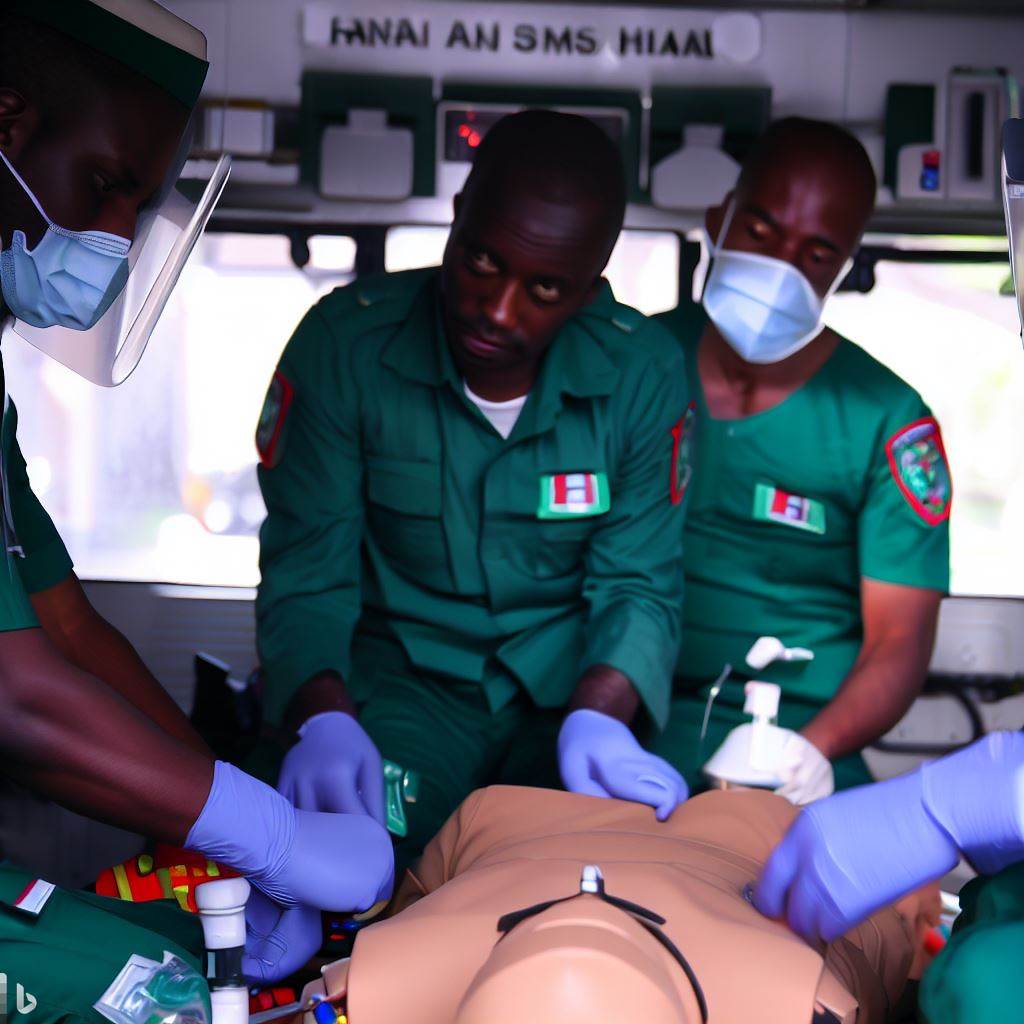Introduction
A paramedic is a healthcare professional who provides emergency medical care. Paramedics play a vital role in Nigeria by saving lives and providing critical healthcare.
The purpose of this blog post is to guide individuals on the road to becoming a successful paramedic in Nigeria.
Paramedics are healthcare professionals trained in emergency medical care. They play a vital role in Nigeria, where access to healthcare can be limited and emergencies require rapid response.
This blog post aims to guide individuals interested in this career path towards success.
To become a successful paramedic in Nigeria, it is crucial to possess several key qualities. These include compassion, quick thinking, and the ability to remain calm under pressure.
Additionally, a paramedic must possess the necessary medical knowledge and expertise to provide appropriate emergency care.
In Nigeria, where healthcare infrastructure can be lacking, the role of paramedics becomes even more important.
Often, they are the first point of care for those in need, providing life-saving interventions before patients can be transported to hospitals.
To embark on the journey of becoming a paramedic in Nigeria, one must first obtain the necessary education and training.
This typically includes completing a paramedic training program, acquiring the relevant certifications, and gaining practical experience through internships or on-the-job training.
Apart from the formal education, aspiring paramedics should also focus on developing their interpersonal and communication skills.
Building strong relationships with patients, their families, and other healthcare professionals is essential to providing effective care.
In the end, becoming a successful paramedic in Nigeria demands a combination of medical expertise, compassion, and the ability to handle high-pressure situations.
Through the right education, training, and personal development, individuals can make a significant impact in the healthcare sector while saving lives and improving the well-being of others.
Requirements and Qualifications
To become a successful paramedic in Nigeria, specific requirements and qualifications must be met. These include educational background, training and certification, as well as licensing and registration.
Educational background
Aspiring paramedics need to have a high school diploma. Additionally, having a background in science-related subjects is beneficial in acquiring the necessary knowledge and skills for the profession.
Training and certification
After completing the basic educational requirements, individuals need to undergo paramedic courses.
These courses provide comprehensive training in emergency medical care and equip aspiring paramedics with the necessary knowledge and skills to handle various situations.
Moreover, internships or practical training programs are essential for gaining hands-on experience and applying theoretical knowledge in real-life scenarios.
Licensing and registration
To practice as a paramedic in Nigeria, individuals must meet the requirements set by the regulatory body responsible for overseeing the profession.
These requirements may include completing specific training programs, passing national exams, and fulfilling other criteria necessary to obtain a license and be registered as a professional paramedic.
It is important to note that each state may have its own distinct set of requirements and regulations regarding paramedic licensure and registration.
Therefore, it is crucial for aspiring paramedics to familiarize themselves with the specific requirements of the state they intend to practice in.
In fact, becoming a successful paramedic in Nigeria requires meeting certain educational, training, and licensing requirements.
It is crucial for aspiring paramedics to acquire a high school diploma and pursue science-related subjects to lay a solid foundation for their career.
Undertaking paramedic courses and practical training programs is essential for gaining the necessary skills and experience.
Finally, obtaining the required license and registration by meeting the regulatory body’s guidelines enables individuals to practice as professional paramedics in Nigeria.
Read: Exploring Paramedic Training Opportunities in Nigeria
Skills and Personal Attributes
Physical fitness
In order to become a successful paramedic in Nigeria, one must possess good physical fitness.
Physical fitness is imperative for individuals who aspire to become successful paramedics in Nigeria. The role of a paramedic often involves physically demanding tasks such as lifting patients or performing CPR.
Good physical fitness ensures that paramedics can carry out their duties efficiently without compromising their own well-being.
Strong communication skills
Effective communication is crucial for a paramedic to convey information accurately and efficiently.
In addition to physical fitness, possessing strong communication skills is vital for a paramedic. Effective communication allows paramedics to interact with patients, their families, and the medical team.
It is important for paramedics to convey information clearly and accurately to ensure seamless collaboration and understanding.
Problem-solving and critical thinking
A successful paramedic should have the ability to analyze situations and make quick, informed decisions.
Problem-solving and critical thinking skills are equally important in the field of paramedicine. Paramedics often face challenging and unpredictable situations that require quick thinking and decision-making.
The ability to analyze a situation, assess risks, and make informed choices is essential for providing the most appropriate care to patients in a timely manner.
Ability to handle stress and emergencies
The demanding nature of the job requires paramedics to remain calm and focused in stressful situations.
Paramedics must also have the ability to handle stress and emergencies effectively. The nature of the job exposes them to high-pressure situations, where they need to remain calm and focused.
The capacity to manage stress not only helps paramedics to perform their duties efficiently but also ensures that the well-being of the patients is prioritized.
Compassion and empathy
Paramedics need to show empathy towards patients and their families during emergency situations.
Moreover, demonstrating compassion and empathy towards patients and their families is a crucial attribute for a paramedic.
During emergencies, people may be in distress or experiencing trauma. Showing compassion and empathy helps to alleviate their fears and provide reassurance.
It also fosters a positive connection between the paramedic and the patient, promoting trust and a sense of comfort.
In essence, aspiring paramedics in Nigeria need to possess a range of skills and personal attributes to succeed in their profession.
Physical fitness, strong communication skills, problem-solving abilities, the capacity to handle stress, and compassion towards others are all indispensable qualities for a successful career in paramedicine.
By continuously developing and honing these skills, individuals can make a meaningful impact in the lives of patients and contribute significantly to the healthcare system.
Read: Day in the Life: Medical Laboratory Technician in Nigeria
Job Opportunities and Career Development
As a paramedic in Nigeria, there are various job opportunities and avenues for career development.
This chapter will explore the options available for paramedics in terms of employment, advancement, and continuous professional growth.
Employment options
- Public hospitals: Paramedics in Nigeria can find employment in public hospitals, where they work as part of a medical team providing emergency medical care to patients.
- Private ambulance services: Another employment option for paramedics is private ambulance services.
These services are often contracted by individuals, companies, or events to provide emergency medical support. - NGOs or disaster response teams: Paramedics can also work with non-governmental organizations (NGOs) or disaster response teams.
These organizations provide medical assistance in times of emergencies and natural disasters.
Advancement opportunities
- Specialty certifications: Paramedics can advance in their careers by obtaining specialty certifications.
These certifications, such as Advanced Cardiac Life Support (ACLS) or Pediatric Advanced Life Support (PALS), allow paramedics to specialize in specific areas of emergency medicine. - Leadership roles: Paramedics who have gained experience and expertise can take up leadership roles within their organizations.
They can become supervisors, managers, or even directors, overseeing the operations of a medical team or department.
Continuing education and professional development
Paramedics in Nigeria have opportunities for continuing education and professional development.
They can attend workshops, conferences, and seminars to stay updated with the latest advancements in the field of emergency medicine.
Continuing education helps paramedics enhance their skills and knowledge, enabling them to provide better care to patients. It also opens doors to new job opportunities and career advancements.
Professional development involves activities such as participating in research projects, publishing articles, or presenting at conferences.
These endeavors contribute to the paramedic’s professional growth and can lead to recognition within the medical community.
In a nutshell, a career as a paramedic in Nigeria offers job opportunities in public hospitals, private ambulance services, and NGOs or disaster response teams.
Paramedics can advance their careers through specialty certifications and leadership roles, while continuing education and professional development are crucial for their growth and success in the field.
Read: Essential Skills Needed for a Paramedic in Nigeria

Challenges and Rewards of Being a Paramedic in Nigeria
Workload and long hours
Being a paramedic in Nigeria comes with heavy workload and long working hours, often extending beyond the regular shifts.
Paramedics often work in high-pressure environments, handling emergencies and life-threatening situations.
Shifts can be unpredictable and may require paramedics to be available 24/7, including weekends and holidays.
The workload can be overwhelming, with multiple emergencies and limited resources to handle them efficiently.
Paramedics have to be constantly on their toes, ready to respond to any emergency at a moment’s notice.
Long working hours can lead to physical exhaustion and burnout, affecting the overall well-being of paramedics.
Emotional and physical toll
The nature of their work exposes paramedics to emotional and physical challenges on a daily basis.
Paramedics often witness traumatic events, such as accidents or violence, which can cause emotional distress.
Dealing with the suffering and pain of patients can take a toll on their mental health and resilience.
Being in physically demanding situations, such as carrying heavy equipment or lifting patients, can lead to physical injuries.
The constant exposure to infectious diseases poses a risk to their own health and well-being. Paramedics must find healthy coping mechanisms to manage the emotional and physical toll of their work.
Read: How to Become a Medical Lab Technician in Nigeria
Financial considerations
Despite the challenging nature of their job, paramedics in Nigeria often struggle with financial difficulties.
The salary packages for paramedics in Nigeria may not be sufficient to meet their basic needs and provide for their families.
Limited financial resources limit access to necessary equipment and training, hindering their ability to provide quality care.
Paramedics may have to work additional jobs or rely on overtime shifts to supplement their income.
Financial instability can increase stress levels and negatively impact job satisfaction. Improved financial support and incentives are necessary to attract and retain talented paramedics in Nigeria.
Fulfillment and impact on people’s lives
Despite the challenges, being a paramedic in Nigeria can be immensely fulfilling and impactful on people’s lives.
Saving lives and providing immediate medical care to those in need gives paramedics a sense of purpose and accomplishment.
Making a positive difference in communities and helping individuals in their most vulnerable moments is rewarding.
Paramedics have the opportunity to build strong relationships with patients, offering comfort and reassurance during emergencies.
Their expertise and knowledge can educate the public on health and safety measures, reducing preventable emergencies.
Being a paramedic allows individuals to contribute to the healthcare system and make a lasting impact on society.
In general, the road to becoming a successful paramedic in Nigeria is challenging but also rewarding. Paramedics face heavy workloads, long hours, emotional distress, and financial difficulties.
However, the fulfillment and impact they have on people’s lives make it a noble and worthwhile profession.
Steps should be taken to address the challenges faced by paramedics and provide adequate support in order to enhance the quality of emergency medical care in Nigeria.
Read: Exploring the Job Market for Lab Technicians in Nigeria
See Related Content: The Role of Exercise Physiology in Nigeria’s Sports Industry
Tips for Navigating the Road to Success
Networking and Building Connections
- Attend relevant seminars, conferences, and workshops to expand your professional network.
- Connect with other paramedics, healthcare providers, and organizations in the field.
- Join professional associations and online communities to stay updated and form valuable connections.
- Volunteer or shadow experienced paramedics to gain practical experience and expand your network.
- Maintain strong relationships with colleagues, supervisors, and mentors to access opportunities and support.
Seeking Mentorship and Guidance
- Find a mentor who can provide valuable advice, guidance, and support throughout your career journey.
- Seek out experienced paramedics who can share their knowledge and help you navigate challenges.
- Attend workshops or seminars led by accomplished professionals to learn from their experiences.
- Ask for feedback and actively seek opportunities to learn from others in your field.
- Build a strong relationship with your supervisor and initiate regular conversations about career growth.
Embracing Continuous Learning
- Stay updated with the latest advancements and research in the field of paramedicine.
- Seek out professional development opportunities to enhance your skills and knowledge.
- Pursue additional certifications and specialized training to stand out in the field.
- Read books, research papers, and industry blogs to broaden your understanding of paramedic practices.
- Attend conferences and webinars to learn from experts and stay abreast of industry trends.
Building Resilience and Self-Care Strategies
- Develop a support system of friends, family, and colleagues who understand the demands of your profession.
- Practice self-care activities such as exercise, meditation, and hobbies to manage stress and prevent burnout.
- Seek professional help if needed and prioritize your mental health.
- Learn effective time management and work-life balance techniques to maintain overall well-being.
- Celebrate successes and acknowledge your growth to stay motivated and resilient in your paramedic journey.
Success in the field of paramedicine requires more than just acquiring skills and knowledge. Building a strong network of connections can open doors to opportunities and collaborative partnerships.
Publish Your Professional Profile, Business or Brand
Showcase your expertise, gain trust, and boost visibility instantly on Professions.ng.
Publish NowSeeking guidance from experienced professionals can provide valuable insights and accelerate your career progress.
Embracing continuous learning ensures you stay updated with the latest practices and stand out in the field.
Lastly, building resilience and practicing self-care strategies are crucial in maintaining your well-being and long-term success as a paramedic.
Remember, success is not a destination but a journey, and by implementing these tips, you can navigate the road to becoming a successful paramedic in Nigeria.
Read: Top Institutions to Study Phlebotomy in Nigeria
Conclusion
Recap of key points discussed
Throughout this blog section, we have highlighted the essential steps to becoming a successful paramedic in Nigeria.
These include acquiring the necessary education and training, obtaining relevant certifications, and gaining practical experience.
Encouragement for aspiring paramedics in Nigeria
To all aspiring paramedics in Nigeria, remember that your journey towards success may be challenging, but it is achievable.
tay motivated, persevere through difficulties, and continuously update your knowledge and skills.
Final thoughts and call to action
The role of paramedics in Nigeria is crucial, as they are the first line of response in emergency situations.
By pursuing this career, you have the opportunity to positively impact lives and contribute to the well-being of your community.
Take action now and embark on your road to becoming a successful paramedic in Nigeria.




